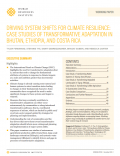A growing number of countries at all levels of development have legislation or regulations prescribing the application of Strategic Environmental Assessment (SEA) - and many more are introducing it as part of their policy tools. This is creating unique opportunities for better policy making and planning by incorporating environmental considerations into high-level decision-making and opening new mechanisms to build consensus on development priorities within governments themselves and between governments and societies.
The Kingdom of Bhutan is known internationally for its exemplary efforts to safeguard the environment. In 2006, the National Environment Commission decided to move beyond safeguarding and implement Bhutan’s concept of gross national happiness (Royal Government of Bhutan, 2002) as the objective of development. With harmonised donor assistance, the government has taken some impressive steps to mainstream environmental concerns into national five-year plans and sector policies. This case study outlines the development of environmental mainstreaming for the period from 2006 to 2008, based on SEA principles derived from the SEA Guidance.

